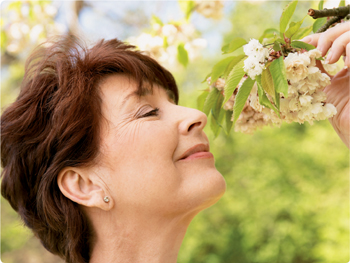65 Look on the Bright Side to reduce Immune System Decline
A positive outlook confers many health benefits, including lower blood pressure and better recovery from surgery. And research shows it can also improve immunity, both by mediating immune-suppressing stress and actively boosting several markers of a healthy immune system. For older adults, the difference may even be significant enough to offset the natural decline of their immune systems.
A generally sunny disposition, as well as having specific high hopes, seems to buffer the damaging effects of stress on the immune system ( 61). For instance, people characterized as being anxious, hostile, and depressed were three times more likely to get sick when exposed to a cold or flu virus than their happy, lively, and calm counterparts, noted a 2006 study in Psychosomatic Medicine. Feeling like you have control over your circumstances makes a difference too. When study participants had actual or perceived control over a stressor, the optimists had better natural killer cell function than their pessimistic peers, reports a 2005 study in the journal Brain, Behavior, and Immunity.
61). For instance, people characterized as being anxious, hostile, and depressed were three times more likely to get sick when exposed to a cold or flu virus than their happy, lively, and calm counterparts, noted a 2006 study in Psychosomatic Medicine. Feeling like you have control over your circumstances makes a difference too. When study participants had actual or perceived control over a stressor, the optimists had better natural killer cell function than their pessimistic peers, reports a 2005 study in the journal Brain, Behavior, and Immunity.
In another study where participants received a vaccine, optimism protected against the inflammatory effects of stress. Perhaps even more important, however, the optimistic volunteers had a higher antibody response to the vaccine. During a similar study, researchers at the University of Pittsburgh found that people with what’s scientifically called “positive affect” (broadly defined as feelings that reflect pleasurable engagement with the environment) responded better to a hepatitis vaccination than people who were negative, moody, nervous, and easily stressed. Since one of the main signs of an aging immune system is being less responsive to vaccinations, these results are very good news for anyone hoping to keep their immune system young and healthy.
Cultivate Optimism for a Stronger Immune System
Evidence indicates that optimism can be learned. “Optimism is not only a matter of perspective, it’s also a matter of choice,” points out Jason F. Mathers, Ph.D., a licensed psychologist in private practice. So how do you become more positive if you don’t naturally have an upbeat outlook? “In working with my clients,” says Mathers, “I often challenge their negative thought patterns by teaching them a four-step process of confrontation, consisting of: a) recognizing the negative thought patterns; b) labeling the thoughts as detrimental to their well-being; c) identifying positive alternatives; and d) making a concerted effort to replace the negative thoughts with the alternatives.” And since optimists do better than pessimists in almost every aspect of life—including immunity—experts agree it’s worth making the effort.
Surrounding yourself with cheerful people can also help you change your perspective. If you’re having trouble breaking out of negative thought patterns, you might even ask a particularly positive friend how she might see your situation in a better light. Funny friends who can help you laugh, at yourself or your circumstances, are also worth seeking out. Laughter boosts your mood, making it easier for you to focus on positive thoughts, and it also relieves stress that can further weaken an aging immune system ( 61).
61).
Put a Stop to Immunity-Sapping Pessimism
Studies have shown that a positive mood is associated with stronger cellular immunity. On the flip side, a 2009 study in the journal Brain, Behavior, and Immunity found that pessimism actually accelerated aging and weakened immune function in postmenopausal women. Making an effort to be more positive may also protect you against depression down the road. “More than once I’ve seen optimism be the only thing that stands between a person falling into a full-blown depression and that same person thriving in the face of adversity,” says Mathers. Depression, which is linked to feelings of hopelessness and pessimism, can be harmful to health. For starters, people who are depressed generally don’t exercise as much, sleep as well, or eat as healthfully—neglecting the building blocks of immunity. Depression also triggers inflammation and suppresses natural killer cell activity and the creation of T cells that fight off infection.
Pessimism is contagious, so minimize the time you spend with complainers, cynics, and other negative people. Talk to your doctor if you suspect you’re depressed. And don’t let pessimism make you passive: “An optimistic person takes hold of the possibility of a [positive] outcome and often works or even fights to make that happen,” notes Mathers.

 61). For instance, people characterized as being anxious, hostile, and depressed were three times more likely to get sick when exposed to a cold or flu virus than their happy, lively, and calm counterparts, noted a 2006 study in Psychosomatic Medicine. Feeling like you have control over your circumstances makes a difference too. When study participants had actual or perceived control over a stressor, the optimists had better natural killer cell function than their pessimistic peers, reports a 2005 study in the journal Brain, Behavior, and Immunity.
61). For instance, people characterized as being anxious, hostile, and depressed were three times more likely to get sick when exposed to a cold or flu virus than their happy, lively, and calm counterparts, noted a 2006 study in Psychosomatic Medicine. Feeling like you have control over your circumstances makes a difference too. When study participants had actual or perceived control over a stressor, the optimists had better natural killer cell function than their pessimistic peers, reports a 2005 study in the journal Brain, Behavior, and Immunity.